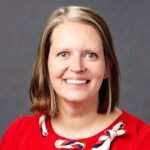Beyond the Lab: Careers in Academic Research Administration
Monday, January 13th, 5:30 – 6:30 PM CST
(Virtual)
Curious about careers in academic research beyond the bench? Join us for a seminar featuring professionals who connect science, strategy, and stakeholder engagement to drive innovation within academic institutions. Discover how research administrators manage large-scale projects, foster interdisciplinary collaborations, align institutional goals, and build relationships with industry and philanthropic partners. Our panelists will share their journeys into academic research administration, highlight the key skills for success, and offer guidance on how you can position yourself for a similar career path in academia.
Cosima Boswell-Koller, PhD
Executive Director of Research Engagement, University of Alabama

Cosima recently joined The University of Alabama (UA) in the Office of Research and Economic Development as Executive Director of Research Engagement, where she leads the Research ASSIST office supporting faculty and staff in the development and capture of large research centers, as well as strategic planning and partnership efforts. She comes to UA after spending 3.5 years at the National Science Foundation (NSF) serving as Program Director for the Materials Research Science and Engineering Centers (MRSEC), Materials Innovation Platforms (MIP), and National Facilities and Instrumentation (NaFI) programs within NSF’s Division of Materials Research. Prior to joining NSF, she served as the Director of the Advanced Manufacturing, Materials, and Processes (AMMP) Program for the National Center for Manufacturing Sciences (NCMS), where she developed, supported, and operated public-private partnerships while also enabling strategic business development activities. Previously, she served as both the Science & Technology (S&T) team lead and Corrosion Acquisition team lead of multiple air vehicle platforms during her time with the Corrosion & Wear Branch at Naval Air Systems Command (NAVAIR). She obtained her PhD from UC Berkeley (2012) and BS from University of Florida (2008).
Jennifer Bradburn Harman, PhD
Executive Director for Research and Research Program Manager, University of Rochester Medical Center

Like many of my colleagues, I stumbled into research administration. My dream was to rise in the ranks of tenured faculty working in an academic medical center studying, manipulating, and eventually conquering cancer all while training the next generation of scientists. Instead, life cast me as a post-doc in cardiovascular research. It was a role I was not well suited for, and while I gained confidence in my science, I was paralyzed by the administrative components of grant applications, struggled, and failed. Defeated, unfunded, and a little desperate, I reinvented myself as a clinical trial project manager for large, multi-site, international drug trials. The majority of these were federally funded. It was in that role that I learned how to develop an entire proposal, where to look for guidance, what the forms required, and apply my training and education. After four years I recognized the parts of my job I enjoyed the most were the same pieces that doomed my post doc career.
Over time the position became less challenging, and I explored new and different job opportunities. I was not sure what I was looking for but knew that I wanted to work on proposal development, application submission, and award management. I thought I hit the jackpot when I found a position in research administration, though I did not know it had a name then. In the decade since, research administration has provided me the opportunity to work as a department RA for a clinical Neurology department, serve as a Director of Sponsored Programs at a PUI, successfully compete for an NIH grant and serve as PI, complete a residency program at the NIH, and return to a clinical department (this time Surgery) under the tutelage of a former mentor with greater responsibility and reach.
Since joining Surgery I have led the strategic plan to build infrastructure for research including both supporting grant funded basic/translational research as well as leveraging institutional resources for the conduct of clinical trials, including device trials. We are now a top 20 NIH funded department of Surgery and have nearly recovered to pre-COVID levels of clinical work. The end result is that we have shifted the culture towards research/scholarship while also protecting the revenue stream of which the enterprise is dependent.
More recently I have chosen to focus more on research/proposal development and away from fiscal management of awards. I have not been successful in ridding myself of compliance and fiscal responsibilities, but I have a larger role in mentoring faculty new to research or newly engaged, working across schools and institutions to bolster proposals, and working with leadership to develop means to better support faculty and research across the enterprise. I enjoy mentoring others and through NCURA have been active in the regional mentorship program, recently served as Chair for the Education Scholarship Fund Select Committee, and in general stay engaged by volunteering in one regional and one national activity per year. My hope is that through my work Research/Proposal Development and Research Administration within academic medical centers will be viewed as an alternative academic career and valued as a profession.
Sarah O'Brien, PhD
Director of Research Development, University of Illinois Chicago

Sarah O’Brien is a currently a rotational program director for National Science Foundation (NSF) on loan from the University of Illinois Chicago (UIC), where she has served as Director of Research Development in the Office of the Vice Chancellor for Research for the past 7 years. Her work has included facilitating research and scholarship by developing teams and projects that align with extramural funding priorities. She oversees campus seed funding competitions, limited submission opportunities, and serves on various campus committees. Additionally, she has played a key role in launching several interdisciplinary research institutes, has been instrumental in developing large, strategically important proposals, and stood up a shared services resource for grant administration.
Sarah earned her bachelor’s degree in Environmental Science with a minor in Professional Writing from Bradley University and her Ph.D. in Biological Sciences with a concentration in Ecosystem Ecology from UIC. She began her professional career as a research scientist at Argonne National Laboratory before transitioning to research development at the University of Chicago and then UIC. Now on detail at NSF, Sarah helps manage the GRANTED initiative, which seeks to address systemic barriers within the nation’s research enterprise by improving research support and service capacity.

